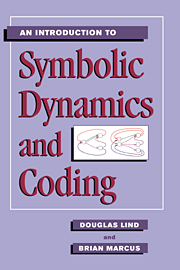Book contents
- Frontmatter
- Contents
- PREFACE
- CHAPTER 1 SHIFT SPACES
- CHAPTER 2 SHIFTS OF FINITE TYPE
- CHAPTER 3 SOFIC SHIFTS
- CHAPTER 4 ENTROPY
- CHAPTER 5 FINITE-STATE CODES
- CHAPTER 6 SHIFTS AS DYNAMICAL SYSTEMS
- CHAPTER 7 CONJUGACY
- CHAPTER 8 FINITE-TO-ONE CODES AND FINITE EQUIVALENCE
- CHAPTER 9 DEGREES OF CODES AND ALMOST CONJUGACY
- CHAPTER 10 EMBEDDINGS AND FACTOR CODES
- CHAPTER 11 REALIZATION
- CHAPTER 12 EQUAL ENTROPY FACTORS
- CHAPTER 13 GUIDE TO ADVANCED TOPICS
- BIBLIOGRAPHY
- NOTATION INDEX
- INDEX
CHAPTER 9 - DEGREES OF CODES AND ALMOST CONJUGACY
Published online by Cambridge University Press: 30 November 2009
- Frontmatter
- Contents
- PREFACE
- CHAPTER 1 SHIFT SPACES
- CHAPTER 2 SHIFTS OF FINITE TYPE
- CHAPTER 3 SOFIC SHIFTS
- CHAPTER 4 ENTROPY
- CHAPTER 5 FINITE-STATE CODES
- CHAPTER 6 SHIFTS AS DYNAMICAL SYSTEMS
- CHAPTER 7 CONJUGACY
- CHAPTER 8 FINITE-TO-ONE CODES AND FINITE EQUIVALENCE
- CHAPTER 9 DEGREES OF CODES AND ALMOST CONJUGACY
- CHAPTER 10 EMBEDDINGS AND FACTOR CODES
- CHAPTER 11 REALIZATION
- CHAPTER 12 EQUAL ENTROPY FACTORS
- CHAPTER 13 GUIDE TO ADVANCED TOPICS
- BIBLIOGRAPHY
- NOTATION INDEX
- INDEX
Summary
In Chapters 7 and 8 we studied two notions of equivalence for shifts of finite type and sofic shifts: conjugacy and finite equivalence. Conjugacy is the stronger and more fundamental notion, while finite equivalence is more decidable. In this chapter, we introduce an intermediate concept of equivalence called almost conjugacy, which was motivated by constructions of codes in ergodic theory.
For a finite-to-one factor code on an irreducible shift of finite type or sofic shift, there is, by definition, a uniform upper bound on the number of pre-images of points in the image. Thus, the number of pre-images can vary through a finite set of positive integers. In §9.1 we show that certain points which are “representative” of the range shift all have the same number of pre-images. This number is called the degree of the code. In §9.2 we focus on codes of degree one, called almost invertible codes, and show how under certain circumstances finite-to-one codes can be replaced by almost invertible codes without changing the domain and range. In §9.3 we introduce the notion of almost conjugacy, which by definition is a finite equivalence in which both legs are almost invertible. We show that entropy and period form a complete set of almost conjugacy invariants for irreducible shifts of finite type and for irreducible sofic shifts. Finally, in §9.4 we conclude with results which assert that the “representative” points are really “typical” points in a probabilistic sense.
Information
- Type
- Chapter
- Information
- An Introduction to Symbolic Dynamics and Coding , pp. 301 - 336Publisher: Cambridge University PressPrint publication year: 1995
